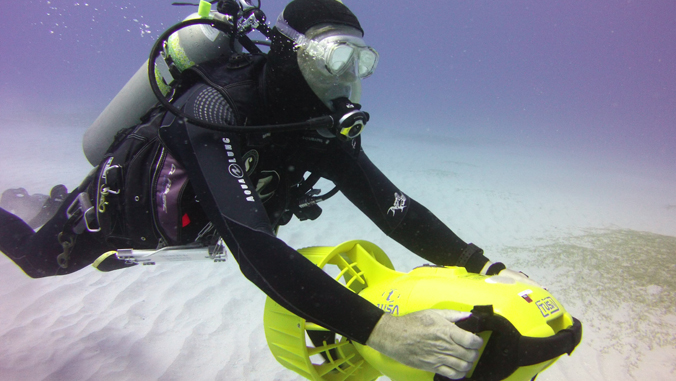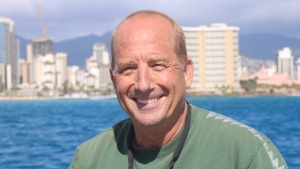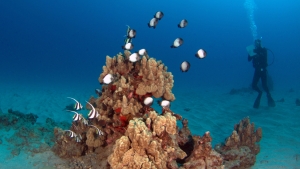
A University of Hawaiʻi at Mānoa expert in marine ecology and conservation biology received a major state research and education honor. School of Life Sciences Professor Mark Hixon was named the 2021 Scientist of the Year by the ARCS (Achievement Rewards for College Scientists) Foundation Honolulu Chapter.

Hixon is the 39th UH faculty member to receive the award, which recognizes “eminent researchers for a career distinguished by significant research achievement and meaningful mentorship to the next generations of investigators.”
“It’s a great honor to join the ranks of other scientists at UH Mānoa whom I greatly respect,” Hixon said. “I am especially grateful that ARCS Honolulu appreciates the mentoring of graduate students, who are society’s future scientists during an era where science is increasingly under attack.”
Hixon is the Sidney and Erika Hsiao Endowed Chair in Marine Biology and serves as chair of the zoology graduate program. He specializes in marine conservation biology, especially coral reefs, which he has studied in many areas around the world. Hixon’s research addresses the questions of how to enhance the resilience of corals to bleaching, what determines the number of fish in the sea, how many different species naturally coexist on coral reefs, and how marine reserves and artificial reefs help to conserve sea life and enhance fisheries.
Hixon’s online lecture

Hixon will deliver a free online lecture, “How Science Can Help Save Hawaiʻi’s Coral Reefs,” hosted by ARCS Honolulu on September 2, 5 p.m. Visit ARCS Honolulu’s website to register.
“My desire is to enhance the hope of my audience regarding the effects of climate disruption on our coral reefs,” Hixon said. “So much about climate change is beyond local control and seems hopeless, yet here in Hawaiʻi there are specific actions we can take to ensure our reefs survive ocean warming and acidification.”
More about Hixon
After completing his graduate work at the University of California, Santa Barbara, Hixon came to UH as a National Science Foundation postdoctoral fellow in the late 1970s, where he began his studies of coral reefs. Hixon then spent 28 years as a professor of marine ecology and conservation biology at Oregon State University, before returning to UH as an endowed professor in 2013.
In 2004, Hixon was recognized by the Institute for Scientific Information Citation Index as the
most cited scientific author on coral-reef ecology in the U.S. He is a Fulbright Senior Scholar, Aldo Leopold Fellow and International Coral Reef Society Fellow, and he serves on the editorial boards of multiple scientific journals. He is past chair of the Marine Protected Areas Federal Advisory Committee for the National Oceanic and Atmospheric Administration and the Ocean Sciences Advisory Committee for the National Science Foundation. Hixon has won various awards for teaching, and his public outreach includes TED talks and appearances on the PBS TV show Saving the Oceans.
Hixon’s work is an example of UH Mānoa’s goals of Excellence in Research: Advancing the Research and Creative Work Enterprise (PDF) and Building a Sustainable and Resilient Campus Environment: Within the Global Sustainability and Climate Resilience Movement (PDF), two of four goals identified in the 2015–25 Strategic Plan (PDF), updated in December 2020.

